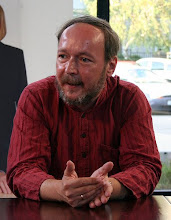

Saturday evening I met with people from Anveshi, the prestigeous women's studies organisation in Hyderabad and gave a 3 hours lecture on my experiences as a survivor of psychiatry and human rights activist. In spite of the heavy monsoon that made traffic a nightmare about 25 people came to listen to the presentation and to participate in the subsequent discussion.
Anveshi was set up in 1985 in Hyderabad by a small group of activist-scholars to provide resources to research and develop a feminist theory relevant to women's lives in contemporary India. Today they are one of the foremost non-university research centers in India. Their work focuses on six research initiatives: education; health and health care systems; law and critical legal theory; dalits and minorities; development; and public domain. Projects in these initiatives examine the shifts in development theory; the crisis of medicine in the Indian context; hegemonic perspectives in school textbooks; the question of secularism and minority in Indian politics; the problematic nature of law and rights in domestic violence; and thinking about what it entails to be a 'Dalit woman' in modern India.
Their history of campaigns around violence and law in the last twenty years has forced a rethinking on questions of feminist law reform, rights and advocacy. Their involvement in the Uniform Civil Code debates in the 1990s enabled them to interrogate entrenched notions of nation, secularism and religion. All these insights drive their current work on minority. Drawing on their sustained work in women's health and the two health books resulting from it, they are currently collaborating with Christian Medical College, Vellore, on a project aimed at rethinking medical education in India.
Anveshi's work has constantly engaged with caste as it operates in the procedures and institutions of everyday life in modern India. Beginning with a strong focus on caste atrocities, discrimination and reservation policies, their work has since traveled to examining institutions such as welfare and education with the caste question in mind. Their research in school education has foregrounded the problems with existing wisdom on curricular transactions, children from marginalized backgrounds, and notions of ideal childhoods.
In all their research they have found it useful to situate women and their experiences in the relationships, institutions and structures that give them an objective reality: as recipients of health care policies; undervalued participants in political struggles; bearers of the costs of development; and victims of violence seeking state protection. Anveshi has been alert to the problems of dominant perspectives that focus solely on 'women', treating constitutive contexts such as nation, caste, development and culture as mere additive categories. This caution has enabled them to interrogate some of the major impasses of Indian feminism, and work towards crucial alliances in relation to caste, minority and law.

No comments:
Post a Comment